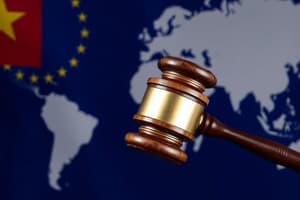Podcast
Questions and Answers
What is the purpose of the system of rules and principles developed in international law regarding state responsibility?
What is the purpose of the system of rules and principles developed in international law regarding state responsibility?
- To impose sanctions on individual citizens for international law violations
- To standardize domestic laws across different nations
- To create a binding treaty for all states to follow
- To determine when a state has violated its obligations and the consequences of such violations (correct)
Which article of the ILC addresses the attribution of conduct related to state responsibility?
Which article of the ILC addresses the attribution of conduct related to state responsibility?
- Article 4
- Article 11
- Article 1
- Article 2(a) (correct)
Which principle does NOT fall under the attribution of conduct in international law?
Which principle does NOT fall under the attribution of conduct in international law?
- Acts by organs on loan from another state
- Acts performed by private individuals
- Acts performed by states in self-defense (correct)
- Acts by insurrectional movements
Which of the following is true regarding the ILC articles on state responsibility?
Which of the following is true regarding the ILC articles on state responsibility?
What does Article 4 of the ILC articles state regarding conduct of state organs?
What does Article 4 of the ILC articles state regarding conduct of state organs?
What is the primary purpose of a lawful countermeasure taken by a state?
What is the primary purpose of a lawful countermeasure taken by a state?
Which of the following scenarios best illustrates wrongful conduct attributed to a state?
Which of the following scenarios best illustrates wrongful conduct attributed to a state?
Under which circumstance can a state agent refrain from performing an international obligation due to distress?
Under which circumstance can a state agent refrain from performing an international obligation due to distress?
According to Article 25 of the ILC articles, when can a state claim precluding wrongfulness on the grounds of necessity?
According to Article 25 of the ILC articles, when can a state claim precluding wrongfulness on the grounds of necessity?
Which aspect is NOT typically considered when determining the attribution of conduct to a state?
Which aspect is NOT typically considered when determining the attribution of conduct to a state?
What major challenge does state responsibility face in international law?
What major challenge does state responsibility face in international law?
What is the immediate obligation of a state that has committed a wrongful act according to Article 30(1) of the ILC articles?
What is the immediate obligation of a state that has committed a wrongful act according to Article 30(1) of the ILC articles?
Which article stipulates that a responsible state must make full reparation for an injury caused by its wrongful act?
Which article stipulates that a responsible state must make full reparation for an injury caused by its wrongful act?
In what situation may a state be obliged to offer assurances and guarantees of non-repetition?
In what situation may a state be obliged to offer assurances and guarantees of non-repetition?
Which of the following is NOT a lawful countermeasure a state can take?
Which of the following is NOT a lawful countermeasure a state can take?
What defines the threshold for necessity as a precluding circumstance for wrongfulness?
What defines the threshold for necessity as a precluding circumstance for wrongfulness?
Under what condition can a state be held responsible for acts not initially attributable to it?
Under what condition can a state be held responsible for acts not initially attributable to it?
What is the significance of Article 10 of the ILC articles regarding insurrectional movements?
What is the significance of Article 10 of the ILC articles regarding insurrectional movements?
Which circumstance explicitly precludes the international wrongfulness of an act in breach of international law?
Which circumstance explicitly precludes the international wrongfulness of an act in breach of international law?
For consent to preclude the wrongfulness of an act, which of the following must be true?
For consent to preclude the wrongfulness of an act, which of the following must be true?
Which of the following is NOT one of the circumstances listed that precludes wrongful acts?
Which of the following is NOT one of the circumstances listed that precludes wrongful acts?
What principle governs the acts of an insurrectional movement before it establishes itself as a government?
What principle governs the acts of an insurrectional movement before it establishes itself as a government?
Which of the following describes a requirement for consent to be valid as per Article 20?
Which of the following describes a requirement for consent to be valid as per Article 20?
How does the Tehran Hostages case exemplify state responsibility for third-party acts?
How does the Tehran Hostages case exemplify state responsibility for third-party acts?
What is the main concern of Article 5 of the ILC articles?
What is the main concern of Article 5 of the ILC articles?
In which situation does Article 6 of the ILC articles apply?
In which situation does Article 6 of the ILC articles apply?
Under what condition does Article 8 of the ILC articles hold a state responsible for the actions of private individuals?
Under what condition does Article 8 of the ILC articles hold a state responsible for the actions of private individuals?
Which example is provided to illustrate the application of Article 8?
Which example is provided to illustrate the application of Article 8?
What stipulation does Article 6 provide regarding the attribution of acts performed by loaned organs?
What stipulation does Article 6 provide regarding the attribution of acts performed by loaned organs?
What aspect of state attribution does private corporation involvement directly challenge?
What aspect of state attribution does private corporation involvement directly challenge?
Which of the following is NOT a function mentioned that may be privatized or delegated?
Which of the following is NOT a function mentioned that may be privatized or delegated?
What was a key reason the ICJ did not hold the US responsible in the Nicaragua case?
What was a key reason the ICJ did not hold the US responsible in the Nicaragua case?
What principle is highlighted by the involvement of private airlines in federal immigration functions?
What principle is highlighted by the involvement of private airlines in federal immigration functions?
Flashcards
State Responsibility
State Responsibility
International law's system for addressing when a state violates its obligations, lacking a direct enforcement mechanism.
Attribution of Conduct
Attribution of Conduct
A core element of state responsibility; determining how wrongful acts by individuals are connected to the state.
ILC Articles
ILC Articles
A set of rules developed by the International Law Commission (ILC) to outline state responsibility, reflecting customary international law and widely referenced.
State Organs
State Organs
Signup and view all the flashcards
Act of State
Act of State
Signup and view all the flashcards
Insurrectional Movement
Insurrectional Movement
Signup and view all the flashcards
International Law Enforcement
International Law Enforcement
Signup and view all the flashcards
Articles 4-11
Articles 4-11
Signup and view all the flashcards
State Attribution
State Attribution
Signup and view all the flashcards
Governmental Authority
Governmental Authority
Signup and view all the flashcards
Private Entities Exercising Govt. Power(Art. 5)
Private Entities Exercising Govt. Power(Art. 5)
Signup and view all the flashcards
Loaned Organs (Art. 6)
Loaned Organs (Art. 6)
Signup and view all the flashcards
Private Individuals (Art. 8)
Private Individuals (Art. 8)
Signup and view all the flashcards
Effective Control (Art. 8)
Effective Control (Art. 8)
Signup and view all the flashcards
Nicaragua Case
Nicaragua Case
Signup and view all the flashcards
State Responsibility for Subsequent Adoption
State Responsibility for Subsequent Adoption
Signup and view all the flashcards
Insurrectional Movement's Actions
Insurrectional Movement's Actions
Signup and view all the flashcards
Consent as Preclusion
Consent as Preclusion
Signup and view all the flashcards
Self-Defense Preclusion
Self-Defense Preclusion
Signup and view all the flashcards
Valid Consent Requirements
Valid Consent Requirements
Signup and view all the flashcards
Lawful Countermeasures
Lawful Countermeasures
Signup and view all the flashcards
Distress as Preclusion
Distress as Preclusion
Signup and view all the flashcards
Necessity as Preclusion
Necessity as Preclusion
Signup and view all the flashcards
Countermeasure Purpose
Countermeasure Purpose
Signup and view all the flashcards
Countermeasure Duration
Countermeasure Duration
Signup and view all the flashcards
Distress (Precluding Wrongfulness)
Distress (Precluding Wrongfulness)
Signup and view all the flashcards
Necessity (Precluding Wrongfulness)
Necessity (Precluding Wrongfulness)
Signup and view all the flashcards
Cessation of Wrongful Conduct
Cessation of Wrongful Conduct
Signup and view all the flashcards
Reparations
Reparations
Signup and view all the flashcards
Assurances of Non-Repetition
Assurances of Non-Repetition
Signup and view all the flashcards
Study Notes
International Law: State Responsibility
- State responsibility is a system of rules and principles to determine when a state violates its obligations and its consequences.
- A competent legal system (domestic or international) must identify concrete rights and obligations, and specify actions when obligations are broken.
- In domestic law, a citizen's actions violating obligations trigger judicial and enforcement action.
- International law lacks enforcement mechanisms for states violating obligations.
- State responsibility is the process when a state violates its international obligations.
Guidance for Invoking State Responsibility
- International law has developed a system of rules and principles to determine when a state violates its obligations and what consequences might follow.
- International Law Commission (ILC) articles on Responsibility of States for Internationally Wrongful Acts (I.L.C.:) are the most important rules and principles.
- The articles were adopted by the ILC in 2001 and recommended by the UN General Assembly.
- These articles are considered customary international law.
Attribution of Conduct
- A core element of state responsibility is attributing wrongful conduct to a state.
- Attribution is determined in ILC articles 4-11, Chapter III.
Principles of State Attribution
Acts performed by the state and its organs.
- Conduct of state organs is considered an act of the state.
- Irrelevant whether the position of the organ is a critical position or not.
Acts performed by organs exercising governmental authority.
- Article 5 of the ILC articles concerns state responsibility for individuals or entities with governmental powers (not state organs).
- Private corporations taking governmental functions are attributable to the state. This includes functions such as military and police, and border control.
Acts by organs on loan from another state.
- States providing organs to other states (e.g., during crisis situations or judge appointments), the actions remain attributable to the state borrowing the organ.
Acts performed by private individuals
- A state is only responsible for private individuals/groups if their actions were done under the state's instructions, directions, or control. The Nicaragua case illustrates this concept.
Acts performed by third parties but adopted subsequently.
- If a state later acknowledges conduct that was not attributable to it in the original instance, this acknowledgment and adoption can make the state responsible.
Acts of an insurrectional movement.
- The actions of an insurrectional movement are not normally attributable to a state.
- An exception is made if the movement takes power or establishes a new government. In this situation, the new government can be held responsible for previously insurrectional actions.
Circumstances Precluding Wrongfulness
- Chapter V(5) of the ILC articles lists circumstances that exempt a state from responsibility for breach of international law.
- These exemptions include;
- Consent
- Self-defense
- Lawful countermeasures
- Distress
- Necessity
Consent
- A state's valid consent to an act legally exempts them from responsibility for that act (as long as the limits of the consent are not exceeded).
- Consent must be given by someone with the authority to do so; freely given, without coercion; clearly expressed.
Self-defense
- Article 21: an act may be justified as self-defense if in compliance with the UN Charter.
Lawful countermeasures
- A state can take countermeasures against another state's act when complying with international law.
- The goal is to compel the other state to comply with its international obligations.
- Once the offending act is ceased, the countermeasures should also end.
Distress
- An agent of a state may not be held accountable for an action that is necessary to save their own or other's lives (Article 24 ILC).
Necessity
- If the only way for a state to safeguard an essential interest is by acting in a way that violates another international obligation (Article 25 ILC), this exemption applies only if conditions are met.
Consequences of Wrongful Conduct
- The consequences of wrongful conduct include ceasing the wrongful act and providing reparations.
- Ending the wrongful conduct is a primary obligation.
- The state may have to offer guarantees of non-repetition.
- Reparation is an obligation to make full compensation for harm caused by the wrongful act.
Studying That Suits You
Use AI to generate personalized quizzes and flashcards to suit your learning preferences.




